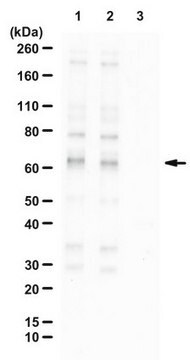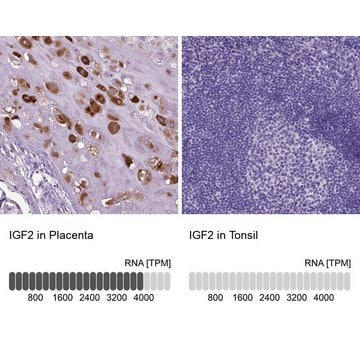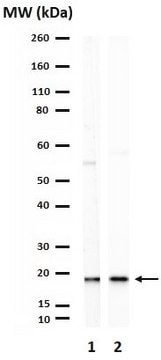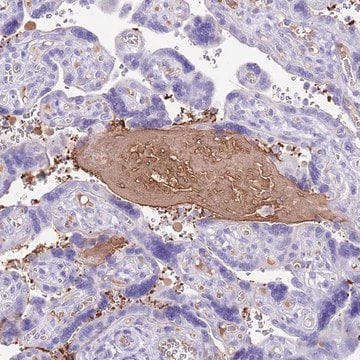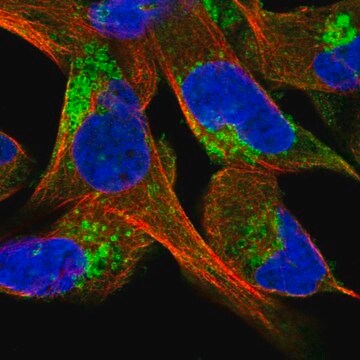MABS460-I
Anti-FGF23 Antibody, clone 278-2
About This Item
Empfohlene Produkte
Biologische Quelle
human
Qualitätsniveau
Konjugat
unconjugated
Antikörperform
purified antibody
Antikörper-Produkttyp
primary antibodies
Klon
278-2, monoclonal
Mol-Gew.
calculated mol wt 27.95 kDa
observed mol wt ~37 kDa
Aufgereinigt durch
using protein G
Speziesreaktivität
human
Verpackung
antibody small pack of 100 μg
Methode(n)
flow cytometry: suitable
western blot: suitable
Isotyp
IgG1κ
Epitopsequenz
Unknown
Protein-ID-Hinterlegungsnummer
UniProt-Hinterlegungsnummer
Versandbedingung
2-8°C
Posttranslationale Modifikation Target
unmodified
Angaben zum Gen
human ... fgf23> FGF23(8074)
Verwandte Kategorien
Allgemeine Beschreibung
Spezifität
Immunogen
Anwendung
Evaluated by Western Blotting in Human brain tissue lysates.
Western Blotting Analysis: A 1:1,000 dilution of this antibody detected FGF23 in Human brain tissue lysates.
Tested Applications:
Flow Cytometry Analysis (FC): 1 μg of this antibody detected Fibroblast growth factor 23 (FGF23) in one million Jurkat cells pretreated with Brefeldin A (1 μg/mL 4 h).
Physikalische Form
Lagerung und Haltbarkeit
Sonstige Hinweise
Haftungsausschluss
Not finding the right product?
Try our Produkt-Auswahlhilfe.
Lagerklassenschlüssel
12 - Non Combustible Liquids
WGK
WGK 1
Flammpunkt (°F)
Not applicable
Flammpunkt (°C)
Not applicable
Analysenzertifikate (COA)
Suchen Sie nach Analysenzertifikate (COA), indem Sie die Lot-/Chargennummer des Produkts eingeben. Lot- und Chargennummern sind auf dem Produktetikett hinter den Wörtern ‘Lot’ oder ‘Batch’ (Lot oder Charge) zu finden.
Besitzen Sie dieses Produkt bereits?
In der Dokumentenbibliothek finden Sie die Dokumentation zu den Produkten, die Sie kürzlich erworben haben.
Unser Team von Wissenschaftlern verfügt über Erfahrung in allen Forschungsbereichen einschließlich Life Science, Materialwissenschaften, chemischer Synthese, Chromatographie, Analytik und vielen mehr..
Setzen Sie sich mit dem technischen Dienst in Verbindung.